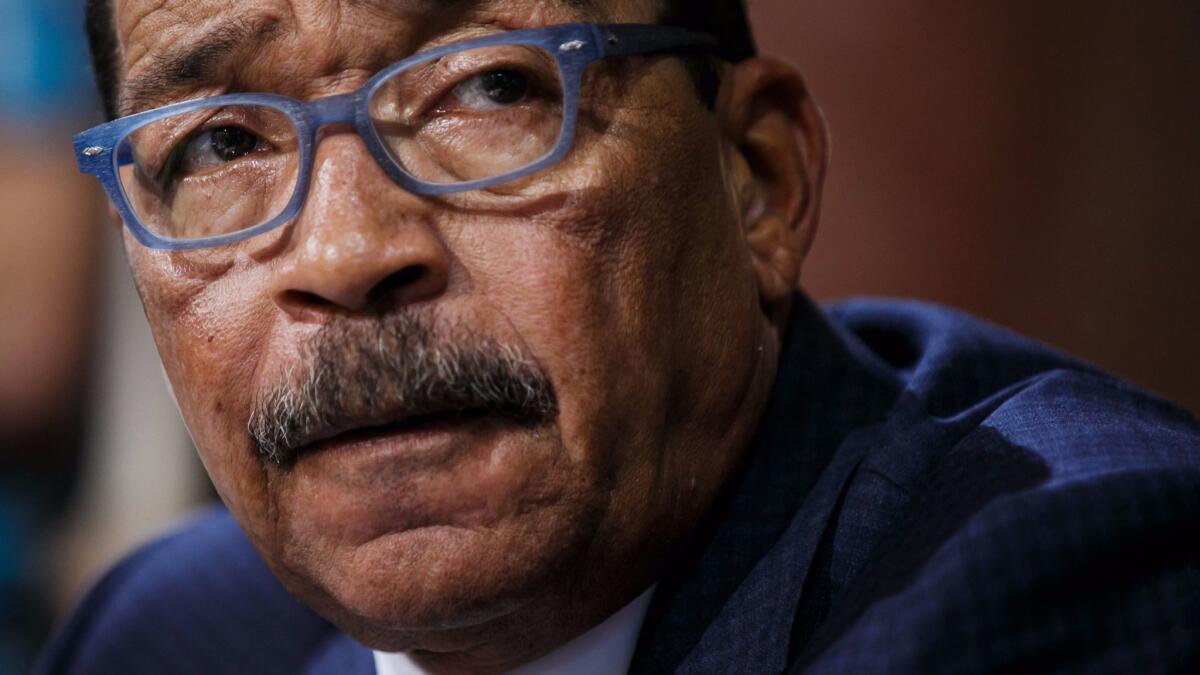L.A. presses forward with proposed rules for marijuana businesses despite industry concerns

Los Angeles lawmakers tentatively backed a sweeping set of proposed regulations for businesses that grow, sell, process and distribute marijuana Monday, the next step toward giving cannabis the stamp of local legitimacy.
But industry groups said that recent changes to the proposed rules would force existing marijuana growers and manufacturers to shut down as they wait to get city licenses, devastating the industry and triggering layoffs.
At a City Council committee hearing, Council President Herb Wesson repeatedly sought to reassure marijuana business owners that he would find a fair way to address those concerns.
“I realize that that’s a flaw and we’re going to try to deal with it,” Wesson said during the meeting. “But I’m not going to let one flaw slow down the process.”
The committee, headed by Wesson, agreed to support the draft regulations. The proposed rules will now go the entire council for a vote before the city attorney drafts the law for final approval.
Los Angeles has been hustling to craft its municipal regulations before California starts issuing state licenses for cannabis businesses next year, legalizing the sale of recreational marijuana across the state. Marijuana businesses will need local approval to get state licenses.
The city first released its draft regulations months ago, but a revised set of rules was made available only Friday.
The draft regulations set out how marijuana businesses can apply for licenses and operate, including what hours they can be open, what records they must keep, and what security systems they have to install. A separate set of zoning rules restricts where they can open their doors.
Cannabis industry groups complained that the revised rules included major changes that could make some businesses shut down in January.
Under the draft regulations, existing pot shops that have been operating according to an earlier set of city restrictions are first in line for city licensing.
When the regulations were first proposed, L.A. was also planning to create a registry for other kinds of marijuana businesses already in operation, such as growers and manufacturers, and allow them to continue to do business while their city applications were being processed.
That plan was scrapped under the revised regulations, which warn that any marijuana business operating without a city license can be targeted by the police and the city attorney. Industry groups such as the Southern California Coalition warned that many existing businesses that supply pot shops with marijuana or cannabis products could wait months for municipal licenses.
“It’s inconceivable how I can shut down my business while waiting for the city to approve my application and also survive,” said Cameron Clarke, who owns a business that makes marijuana edibles and other cannabis products.
Other cannabis business owners complained that they would be forced to leave Los Angeles or that out-of-town companies would swoop in to provide marijuana to local shops.
Americans for Safe Access, an advocacy group that promotes legal access to cannabis for therapeutic use, argued that if existing marijuana cultivators and manufacturers have to shut down until licenses are handed out, that could drive them into bankruptcy and jeopardize the existing supply of marijuana for patients, even at the shops first in line for city approval.
L.A. would end up “licensing empty shells, which will have no way to service patients and will themselves be forced into involuntary bankruptcy,” its director of industry affairs, Sarah Armstrong, who is also affiliated with the Southern California Coalition, wrote in a letter to the council. “This means the city has destroyed the cannabis industry before it’s even fully realized.”
But not everyone involved in the industry agrees.
Aaron Herzberg, a partner with the cannabis real estate and licensing firm Calcann Holdings, countered that it would be unfair for the city to smooth the way for existing marijuana growers and manufacturers to continue operating while other entrepreneurs have been waiting for city licenses before jumping into the industry.
Herzberg said those “illegal operators” have been “exploiting the gray area” in the law and should not get any advantage in city licensing. The question of who will get the first shot at municipal licenses has been especially important to cannabis entrepreneurs because zoning restrictions on marijuana businesses will likely make it difficult for latecomers to find suitable space.
At the Monday hearing, Councilman Marqueece Harris-Dawson said he understood concerns about disrupting the supply chain, but cautioned that simply grandfathering in existing marijuana businesses could perpetuate an overconcentration of pot businesses in areas such as his South L.A. district.
“If we do that, that is a direct betrayal of what we promised the voters … This is something we’ve got to take a hard look at,” Harris-Dawson said.
Wesson said after the hearing that lawmakers were not comfortable with the planned registry for existing manufacturers and cultivators but did not answer questions about what, specifically, had given them pause.
In her letter to the council, Armstrong said it was “understandable that the city would want to vet newcomers to the marketplace who might have unsavory ties to organized crime or gangs.”
Armstrong argued, however, that the city needed to protect “good actors” who have been supplying marijuana shops that have been allowed to avoid city prosecution under Proposition D, which was passed by voters four years ago. She added that in the past, state law had allowed suppliers to provide marijuana as members of cannabis collectives.
Wesson repeatedly said that he wanted to find a fair and efficient way to press forward. But “I don’t know what that is exactly,” he told reporters.
Twitter: @LATimesEmily
More to Read
Sign up for Essential California
The most important California stories and recommendations in your inbox every morning.
You may occasionally receive promotional content from the Los Angeles Times.











